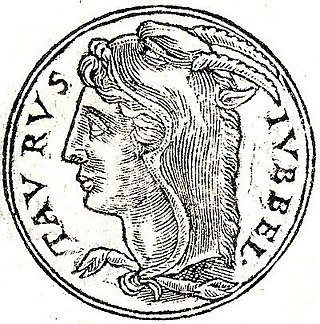Related Research Articles

Antonia the Elder was a niece of the first Roman emperor, Augustus, being the eldest daughter of Octavia the Younger and her second husband, the Triumvir Mark Antony. She married Lucius Domitius Ahenobarbus and became the paternal grandmother of the emperor Nero.

The gens Valeria was a patrician family at ancient Rome, prominent from the very beginning of the Republic to the latest period of the Empire. Publius Valerius Poplicola was one of the consuls in 509 BC, the year that saw the overthrow of the Tarquins, and the members of his family were among the most celebrated statesmen and generals at the beginning of the Republic. Over the next ten centuries, few gentes produced as many distinguished men, and at every period the name of Valerius was constantly to be found in the lists of annual magistrates, and held in the highest honour. Several of the emperors claimed descent from the Valerii, whose name they bore as part of their official nomenclature.
Marcus Valerius Messalla Corvinus was a Roman general, author, and patron of literature and art.
Valeria or Valeria Messalla was the fifth wife of two-term consul and Roman dictator Lucius Cornelius Sulla.
Quintus Pedius was a Roman politician and general who lived during the late Republic. He served as a military officer under Julius Caesar for most of his career. Serving with Caesar during the civil war, he was elected praetor in 48 BC and was given a triumph for victories over the Pompeians during the civil war's second Spanish campaign.
Quintus Fabius Maximus was a general and politician of the late Roman Republic who became suffect consul in 45 BC.
Potitus Valerius Messalla was an Ancient Roman statesman, probably a son of Marcus Valerius Messalla Rufus. He presumably had two sons: Manius Valerius Messalla Potitus and Lucius Valerius Messalla Volesus. In 17 BC, Messalla participated in the Secular games.
Faustus Cornelius Sulla was a Roman senator who lived during the reign of the emperor Tiberius. He was suffect consul in AD 31 with Sextus Tedius Valerius Catullus as his colleague. Faustus was the son of Sulla Felix, a member of the Arval Brethren who died in AD 21, thus a direct descendant of the dictator Sulla. His mother was Sextia and his brother was Lucius Cornelius Sulla Felix.

Lucius Sempronius Atratinus was a Roman politician who was elected suffect consul in 34 BC. He is mentioned in Pro Caelio, a famous speech in defense of Marcus Caelius Rufus by Marcus Tullius Cicero.

Titus Statilius Taurus was the name of a line of Roman senators. The first known and most important of these was a Roman general and two-time consul prominent during the Triumviral and Augustan periods. The other men who bore this name were his descendants.
Marcus Valerius Messalla Appianus was a Roman Senator during the reign of Augustus. He was ordinary consul in 12 BC with Publius Sulpicius Quirinius as his colleague.
Lucius Vipstanus Gallus was a Roman senator who is the first documented member of the gens Vipstana. His descendants and relatives include several consuls.
Marcus Valerius Messalla Rufus, was a Roman senator who was elected consul for 53 BC.
Appius Claudius Pulcher was a Roman politician. An early supporter of Augustus, he was elected consul in 38 BC.

Lucius Marcius Philippus was a Roman politician who was elected suffect consul in 38 BC. He was step-brother to the future emperor Augustus, as well as his uncle
Gaius Cocceius Balbus was a Roman politician and military commander who served as suffect consul in 39 BC.
Lucius Cornelius Lentulus was a suffect consul in 38 BC, in the late Roman Republic.
Lucius Cornelius Lentulus was a Roman politician and military officer who served as consul in 3 BC.
Gnaeus Pompeius (Rufus) (died AD 14) was suffect consul in 31 BC, during the transitional period when Octavian, the future Augustus, was consolidating his powers as princeps.
Lucius Vinicius was a Roman Senator who was appointed suffect consul in 33 BC.